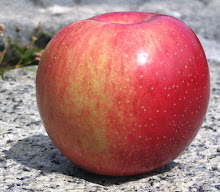Of course the answer to this depends on where you live. Here in New England the farmers' markets are done and the question is, what's at the store?
We are blessed, if that is the word, with the presence of several major supermarket chains near my neighborhood. Instead of making any particular recommendations about what to eat, this month I'll just survey what is available.
After all, you probably know these apples. Still, if you see something you haven't tried before, bite it!
Field report
This week it is selling the following five apples: Cortland, Granny Smith, McIntosh, and Red and Golden Delicious. This is a lot of variety for such a small market! All the other sellers had these five basic varieties too.
Johnnie's Foodmaster is a small chain of supermarkets (about a dozen stores) in the Boston area. Produce is not Johnnie's strength, but they sell all five of the above plus Fuji (spelled "Fugi") and Gala.
Just down the road is Stop and Shop, a larger chain. The Arlington store has a generally good produce department. In January that means the above basic varieties plus Braeburn, Empire (but only in large plastic bags), Honeycrisp, Jazz, and Pink Lady. That's a dozen choices, not bad.

|
| Ambrosia |
A few miles to the east Shaw's, another large chain, has all of the above at its Porter Square (Cambridge) store except for Honeycrisp and Jazz.
To make up for that, though, Shaw's is selling Ambrosia, one of the sweet surprises of last winter, and Pacific Rose, of which I've yet to have the pleasure. Also, the Empires there are not bagged up.
Finally, Whole Foods Market, the upscale natural-foods chain, has all of the above varieties except Ambrosia, Empire, and Pacific Rose. It also sells Gingergold and Jonagold.
That's sixteen varieties within two miles of my house.
This is not a bad haul for New England in January! Note especially apples that you'd not have found five years ago, like Ambrosia, Jazz, Gingergold, Honeycrisp, and Pacific Rose. Clearly the market is chasing a consumer preference for variety.
Winter fruit
I'll be leaning pretty heavily on Macouns for as long as they last, probably not much past Groundhog's Day, but also other varieties such as Ambrosia, which made its debut here fifty weeks ago.
A few years ago these fruits would probably have been labeled with their states of origin, but today they all just say "USA." The exception is at Whole Foods, which notes that its apples come from Washington State, except McIntosh and its kin, Macoun and Cortland. These are from New York. I assume this is true of the apples sold elsewhere, too, and that the Empires come from New York.
Are these New York apples available across North America in the winter? Or are they only sold here in the Northeast? It's hard to imagine them shipped out to the West Coast, but what about in the South?
There are no apples from New England (until next summer). I wonder, though, if some growers here don't sell to distributors in New York, who store the apples and then ship them back here. Ah, commerce.
What's for sale where you live?
Update: You might enjoy this later report on January apples.
Update January 2014: Johnie's Foodmaster has closed, alas, but on the plus side there are some worthy new varieties available in January such as Opal and, briefly, Junami.
Also just a bit further from my house is the new Somerville Farmers Market, which is selling (among others) Golden Russet and Hudson's Golden Gem! It's like a bit of October in January.


Thanks--I Iook forward to hearing what you've got.
ReplyDeleteHere's what's available 1/18/10 in Lawrence, KS at the Community Mecantile Food Coop:
ReplyDeleteGala - WA
Honeycrisp - WA
Pinova/Corail - WA
Pinova (no corail?) - WA
Cameo - WA
Golden Delicious - CO
Granny Smith - WA
Pink Lady - AZ
Braeburn - WA
Fuji - WA and CA
Red Delicious - WA
I don't know what Pinova/Corail is. Is that a cross?
Phil
Pinova and Corrail are the same as Piñata, the latter being a trademark. It's like the relationship between the names Cripps Pink and Pink Lady.
ReplyDeleteMy guess is that the patent of the apple has expired and that growers are selling this fruit under its actual name to avoid licensing fees. Meanwhile the trademark holder is aggressively marketing Piñata across the U.S.
It's the same apple, though often the trademark holder will require fruit sold under the mark to meet certain physical standards of size and color.
Also, Phil, I like these and think they are worthy of your attention--try one and see what you think!